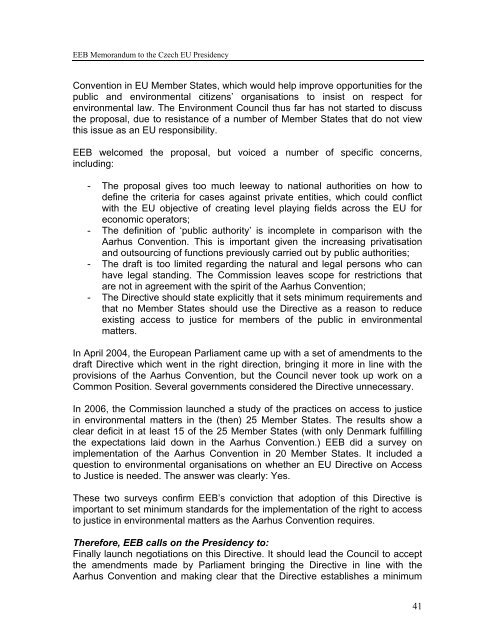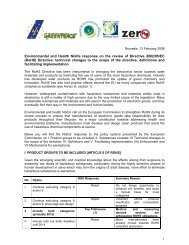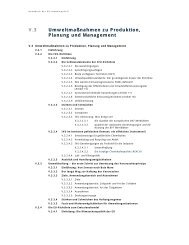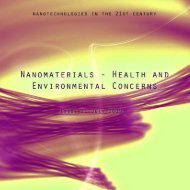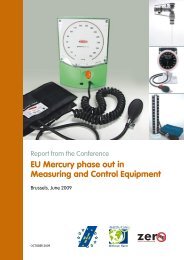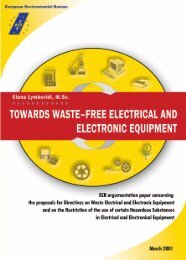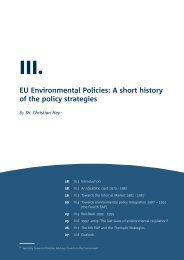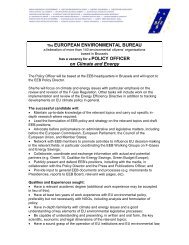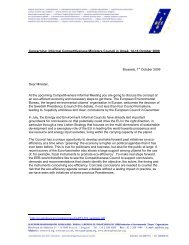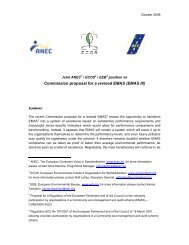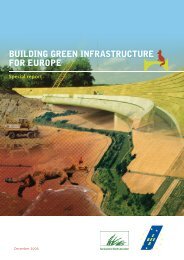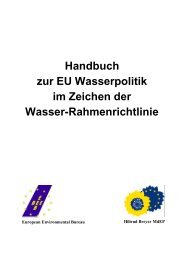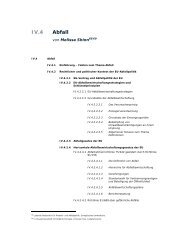Memorandum to Czech Presidency and Ten Test - EEB
Memorandum to Czech Presidency and Ten Test - EEB
Memorandum to Czech Presidency and Ten Test - EEB
- No tags were found...
Create successful ePaper yourself
Turn your PDF publications into a flip-book with our unique Google optimized e-Paper software.
<strong>EEB</strong> <strong>Memor<strong>and</strong>um</strong> <strong>to</strong> the <strong>Czech</strong> EU <strong>Presidency</strong>Convention in EU Member States, which would help improve opportunities for thepublic <strong>and</strong> environmental citizens’ organisations <strong>to</strong> insist on respect forenvironmental law. The Environment Council thus far has not started <strong>to</strong> discussthe proposal, due <strong>to</strong> resistance of a number of Member States that do not viewthis issue as an EU responsibility.<strong>EEB</strong> welcomed the proposal, but voiced a number of specific concerns,including:- The proposal gives <strong>to</strong>o much leeway <strong>to</strong> national authorities on how <strong>to</strong>define the criteria for cases against private entities, which could conflictwith the EU objective of creating level playing fields across the EU foreconomic opera<strong>to</strong>rs;- The definition of ‘public authority’ is incomplete in comparison with theAarhus Convention. This is important given the increasing privatisation<strong>and</strong> outsourcing of functions previously carried out by public authorities;- The draft is <strong>to</strong>o limited regarding the natural <strong>and</strong> legal persons who canhave legal st<strong>and</strong>ing. The Commission leaves scope for restrictions thatare not in agreement with the spirit of the Aarhus Convention;- The Directive should state explicitly that it sets minimum requirements <strong>and</strong>that no Member States should use the Directive as a reason <strong>to</strong> reduceexisting access <strong>to</strong> justice for members of the public in environmentalmatters.In April 2004, the European Parliament came up with a set of amendments <strong>to</strong> thedraft Directive which went in the right direction, bringing it more in line with theprovisions of the Aarhus Convention, but the Council never <strong>to</strong>ok up work on aCommon Position. Several governments considered the Directive unnecessary.In 2006, the Commission launched a study of the practices on access <strong>to</strong> justicein environmental matters in the (then) 25 Member States. The results show aclear deficit in at least 15 of the 25 Member States (with only Denmark fulfillingthe expectations laid down in the Aarhus Convention.) <strong>EEB</strong> did a survey onimplementation of the Aarhus Convention in 20 Member States. It included aquestion <strong>to</strong> environmental organisations on whether an EU Directive on Access<strong>to</strong> Justice is needed. The answer was clearly: Yes.These two surveys confirm <strong>EEB</strong>’s conviction that adoption of this Directive isimportant <strong>to</strong> set minimum st<strong>and</strong>ards for the implementation of the right <strong>to</strong> access<strong>to</strong> justice in environmental matters as the Aarhus Convention requires.Therefore, <strong>EEB</strong> calls on the <strong>Presidency</strong> <strong>to</strong>:Finally launch negotiations on this Directive. It should lead the Council <strong>to</strong> acceptthe amendments made by Parliament bringing the Directive in line with theAarhus Convention <strong>and</strong> making clear that the Directive establishes a minimum41


